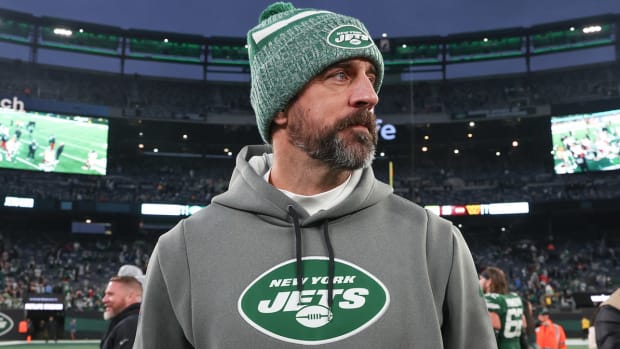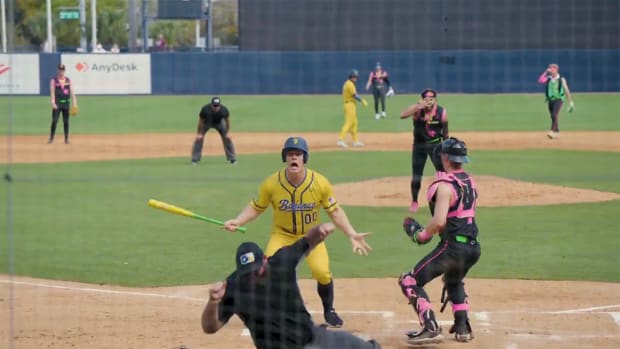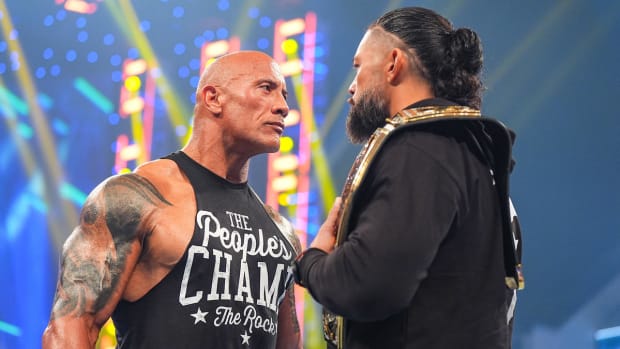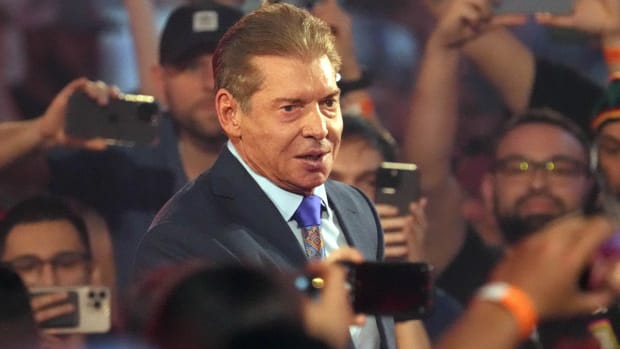Q&A: Drew Gulak on the Value of Working With Daniel Bryan and His ‘SmackDown’ Match vs. AJ Styles
Drew Gulak is set for the most important match of his wrestling career against AJ Styles on Friday night’s SmackDown. The Intercontinental title is on the line, but this match also serves as an opportunity for Gulak to connect with the WWE viewership.
A 12-to-15-minute match, which is the often the sweet spot on WWE television, should allow Gulak the chance to showcase his ability as a mat technician, especially since he is working with an elite talent in Styles. Even more importantly, Gulak needs viewers to better grasp his never-say-die, Philly underdog persona. If he can successfully do that, then the immediate future becomes even brighter for the newly re-signed WWE star.
Gulak has a great mind for wrestling, and he has worked relentlessly for the past decade-and-a-half to attain his current status in WWE. Gulak wrestling Styles is particularly compelling considering it features two generations of top indie stars colliding in a match that fans were never able to see on the independent circuit.
Speaking with Sports Illustrated, Gulak discussed a myriad of topics, including preparing for the match amid COVID testing, the chance to work with Daniel Bryan and his enormous respect for AJ Styles.
Justin Barrasso: Did you take a COVID test? Did it come back negative? And is the match with AJ Styles on for SmackDown?
Drew Gulak: I did, and it did. As yes, as far as I know, the match is on.
JB: There is such magnitude to wrestling AJ Styles in prime time on Fox. Have you been extra vigilant in your isolation away from the work place?
DG: I have been sitting in a hyperbaric chamber studying wrestling tapes nonstop and doing a lot of Hindu squats.
JB: I want to get into the match, but before we do, I’d be remiss not to discuss Daniel Bryan, who, like you, built his reputation in the indies. How did your partnership form? Was it his idea to work with you?
DG: When he took his time off from wrestling because of an injury, he had to sit out from something he’d done for basically his entire adult life. And he watched the Cruiserweight Classic [in 2016], which was his first time getting to see me wrestle in-person. I think that woke something up inside him. Like, ‘Man, this guy is doing something I wish I was doing right now. I’d love to wrestle him.’ I think that’s a real feeling that he had, and that stuck with him.
But ever since then, I was part of the cruiserweight division, and we were kept separate from the rest of the main roster at the time. Flash forward to seven months ago, I am on the SmackDown roster, so we had the chance to finally have a match. I remember when I got announced on Twitter as having been drafted to SmackDown, he actually quoted it and made a tweet along the lines of, ‘Man, I’d love to wrestle Drew.’ For some reason, it just never happened. I was thrown out there with Braun Strowman, I was thrown out there with Otis, I wrestled Mustafa Ali. Finally, it took until I ran my mouth backstage and said that I saw some holes in Bryan’s game. We were able to have our match at Elimination Chamber and kick things off from there.
JB: Wrestling is so subjective, which you have clearly encountered after 15 years in the business. What does it mean to you, after pouring in years of hard work and dedication, that Daniel Bryan wants to work with you?
DG: It’s an honor. Bryan has gone on to main event WrestleMania and win the championship, which he did coming from the independent scene. He traveled around the world winning titles, then finally came to WWE and has had success and won championship after championship here. For him, a performer that is so special to the industry, to see potential in myself, that is a real honor.
JB: Both matches were excellent, but can you break down your preference between your Elimination Chamber match with Bryan, which felt like a fight, and your SmackDown match, rooted in technical wrestling, from May?
DG: My preference is the SmackDown match. That’s a personal preference. Although I can say that the one at Elimination Chamber definitely had a bigger impact on my career. That one at Elimination Chamber, it was in Philadelphia and literally down the street from the building I trained in to learn wrestling. My family was in attendance, and it was the first time I was on a pay-per-view and not part of the kickoff show. Not only that, I’m wrestling Daniel Bryan in a singles match. I was in Philly, so I had to bring the fight to him. Even though he won, I still whooped his ass.
The SmackDown match showed a whole other chapter of our relationship, where we showed we can bring out the best in each other. We didn’t throw a strike in our match on SmackDown. Bryan is a very proficient striker, but he’s also an amazing mat technician. We didn’t touch the ropes outside of one moment where he was able to hit a suplex. That was as much of a wrestling match as you can see without anything else added in. For us to be able to do that today, on a live TV show on Fox, as a wrestler, that was such a cool achievement. I was even more honored to be able to do it with him.
JB: Following that SmackDown match with Bryan, you briefly left WWE due to an expired contract, only to return later that same month. What happened? And why did you return?
DG: I actually never missed a TV. I never missed anything. My hiatus was just three or four days because the contract lapsed. It had nothing to do with anything else, just typical business that comes along with [a contract].
JB: Were you surprised at the amount of coverage that story received?
DG: I was surprised how much false information was put out there. At the same time, it’s a good thing that people were talking. There was nothing malicious intended behind any of it. The fact that I’m being reported on is a good thing. It just goes to show that people respect me as a performer.
JB: For you, what is the biggest difference between being a TV wrestler as opposed to a wrestler on the indies? You could be the world’s best wrestler on the indies, but that does not automatically equate to being a star on television in WWE. What is the biggest difference?
DG: That’s a great question. I work as a trainer a lot, too, and I’m asked that by my students that are still on the independents. I would say that the number one thing on the independents is that a lot of the reputation that you get is built off of word-of-mouth among fans. Like, ‘Oh, did you go to this show? It was awesome,’ or ‘This guy is my favorite wrestler, here’s why.’ It’s a lot about connecting one-on-one with a person in a room. When you’re on a show like SmackDown on Fox, with a scope that is enormous—it’s one of the biggest wrestling shows in the world right now, objectively–what we do is not only connect with people in the arena, just like you would on an independent show, but also translate that to a television audience. The number one thing is connecting emotionally with your story to the audience at home through the camera.
A prime example, we have replays on SmackDown. When someone falls out of the ring and takes a nasty spill on an independent show, half the crowd might see it and that’s the end of it. They’re going to show that on television, so you have to kind of chill out and not rush, and the referees have to do a good job of making people stay back. There is a much bigger audience for us to talk to.
JB: Knowing the indies like you do, it represents such a big piece of your soul. There have recently been many allegations of abuse in pro wrestling, from wrestlers in the indies to ones in top promotions, including WWE. What can the pro wrestling community do to ensure it is a safer place for wrestlers?
DG: It’s tough. When you talk about independent companies, there is no governing body, there is no company that can crack down corporately or enforce standards. It has to come down to people being good people. That’s tricky, because when you’re talking about independent wrestling, there are too many people, and you can’t police that. But I will say the fans can do an important job by speaking out and supporting what they actually like, and that should come down to how people are treated, including the fans as well as the performers. You’re going to see now, because of the ‘#SpeakingOut’ movement, a lot of companies changing. Fan bases are making their voices heard, that’s the most important thing.
And it also comes down to just being a good person, being respectful, and communicating. I always stress to my students to communicate. That can be hard when you’re being told something is right or wrong, and that it could have implications on your career. That’s very, very tricky to navigate those waters, especially for someone who is younger. My heart breaks for everybody suffering.
JB: Someone that has been extremely good to the business is Bryan. I know your passions are wrestling and teaching, but what have been the highlights of learning from Bryan? Is it training with him? Getting familiar with his mindset? Cutting promos? It just feels as though there are few better people to partner with in all of wrestling.
DG: I think it’s being around him. Getting to know him as a person, you realize this guy is so good—not just technically in the ring, but in the way he thinks about the world. We were talking about getting rid of plastic one day, and I learned all about it. He’s also super funny. He’s a great dad, and it’s really inspirational to see how he talks about his family and how he treats them.
And then of course, we’re both huge wrestling geeks. We’ll talk about that nonstop. All of a sudden, our match will be up, and we’ll go, ‘Damn, we should have been training that whole time.’ It’s been great to work with him, learn from him, and hopefully for him, vice-versa.
JB: Is this SmackDown match with Styles the biggest match of your career? How do you seize this moment?
DG: I approach every opportunity I get to compete on television with a similar mind state. Not only am I going to wrestle my ass off, but I have a very deep well of wrestling maneuvers and techniques and different styles. I know that I have a wealth of knowledge within me, and there will be stuff I break out that people have never seen before.
That’s how I seize the moment. Number one, I bust my ass and I try to tear it up. Number two, I try to break out something new, exciting, and different. Hopefully people go, ‘I’ve never seen that before. Maybe wrestling can be like this,’ and hopefully that opens someone’s mind about wrestling.
JB: If you were to make a PowerPoint Presentation on why you should be Intercontinental Champion, where would you start?
DG: Where would I start? I would need at least 400 slides to do a preface. I’d start with the history of the Intercontinental Championship, and I’d categorize all of that. Then I’d have to catch up to the point where I started watching wrestling.
And I’m just spit-balling here, planning a PowerPoint is very serious business to me, but then I’d look at my training and who was champion at that time, to the point where I intersected with the Intercontinental Championship. This would be a really hefty one. Not my heftiest, but it would need at least a couple thousand slides. I think I could knock it out in a day.
JB: You’re wrestling AJ Styles for the Intercontinental Championship. What makes Styles so special in the ring?
DG: That’s a tough one to answer because he’s great at everything. That’s the easy answer—he’s done it all, he’s good at everything, and he’s a leader. He can do everything, but what’s so freaking cool about AJ is he’s in his 40s and he moves pretty much the same as he did in his 20s. He still throws his body around and takes these wicked falls, and executes his maneuvers.
He can still hit a springboard at a snap of a finger, and he’s been doing that consistently since he was in his teens. That’s the thing that sets him apart from everyone else. And he hasn’t taken a long time off, ever. He’s the most resilient guy going today.
JB: We already have a good idea about who you are and what you stand for in the ring, but what will wrestling fans watching SmackDown learn about you this Friday?
DG: I still feel like a lot of the SmackDown audience is unfamiliar with me. They’ve seen bits and pieces here and there, but they don’t understand my message yet. My message has been the same—I stick to my guns. I stick to what I know, I stick to what makes me stand out, and that’s the mat game. It’s also the motive of not resorting to cheap tactics or flashy, chauvinistic maneuvers.
I stick to the purity of what I do and I come at you with the grit and attitude that only a Philly boy can bring. Hopefully that translates when I’m whooping AJ’s ass on SmackDown.
Justin Barrasso can be reached at JBarrasso@gmail.com. Follow him on Twitter @JustinBarrasso.




